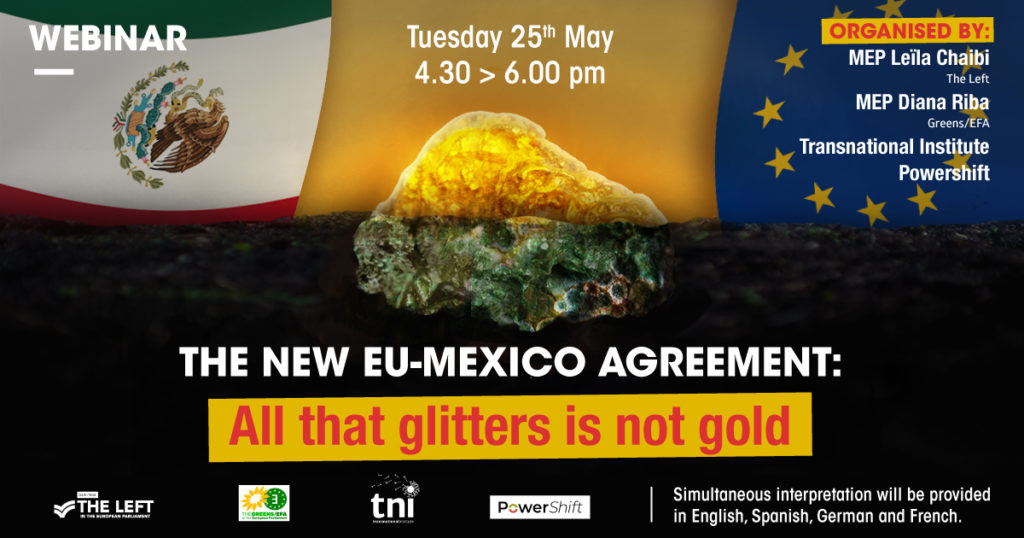The New EU-Mexico agreement: All that glitters is not gold
Tuesday 25th May 2021
4.30 – 6.00 pm (CET Brussels) / 9.30 – 11.00 am (Mexico City)
Webinar
Link to register: http://bitly.ws/dna3
Simultaneous interpretation will be provided in English, Spanish, German and French.
Programme
Welcome and introduction
MEP Leïla Chaibi, The Left, La France Insoumise
MEP Diana Riba, The Greens/EFA, Esquerra Republicana de Catalunya
The New EU-Mexico agreement: Main challenges
Bettina Müller, Transnational Institute, Powershift
An example of the results of the current EU-Mexico agreement in Mexico
Refugio Choreño Gómez, Fundación para el desarrollo Integral Apaztle
First comments
Senator María Merced González González, Movimiento Regeneración Nacional – México
MEP Sara Matthieu, The Greens/EFA, Groen
MEP S&D
MP Heike Hänsel, Die Linke, Bundestag (tbc)
Claude Girod, European Coordination of La Via Campesina, Confédération Paysanne
Cristina Faciaben, Secretary of International and Cooperation of Comisiones Obreras
Nicolas Roux, Amis de la Terre, Attac France
Alberto Arroyo, Plataforma América Latina Mejor sin TLC
Arturo Landeros, Taula per Mèxic
Questions and comments from the public
Conclusions and closure
MEP Leïla Chaibi, The Left, La France Insoumise
MEP Diana Riba, The Greens/EFA, Esquerra Republicana de Catalunya
About
In 2020 the European Union and Mexico reached an “agreement in principle” on the main trade parts of a new EU-Mexico association agreement. The new agreement replaces a previous deal between the EU and Mexico from 2000. According to the European Commission, the original association agreement brought “many benefits to the EU and Mexico, though some trade barriers still remain”.
But all that glitters is not gold. According to research headed by PowerShift, the new agreement doesn’t really mean good news for human rights and environment. Rather, it might give new impetus to liberalisation and deregulation for trade, privatisation and will have negative impacts on employment. It would also include a chapter on investment protection, which would make Mexico the first Latin American country to sign a treaty with Europe that includes this dimension. However, no serious and binding regulations would be included to address corporate accountability. The International Caravan on the impacts of free trade and transnational corporations in 2019 confirmed the existence of environmental and sanitary emergency zones in the industrial corridors where important European investments are located in Mexico. The new agreement can even deepen the current asymmetry established between human rights and the interests of corporations.
Even from a European point of view, the analysis is not more optimistic. Mexican agricultural imports will be to the detriment of European producers. Once again, it is the farmers who will pay for the consequences of trade liberalization.
This Webinar aims to open a dialogue among European and Mexican members of Parliament and civil society to promote a collective reflection on the main challenges the new agreement presents for human rights and the environment. There will be a presentation of PowerShift’s research, as well as a testimony from affected communities in Mexico. MPs and civil society representatives will be able to comment and there will be an open exchange between speakers and participants.
Simultaneous interpretation will be provided in English, Spanish, German and French.
Link to register: http://bitly.ws/dna3
Convenors: The Left, The Greens/EFA, Transnational Institute, PowerShift


